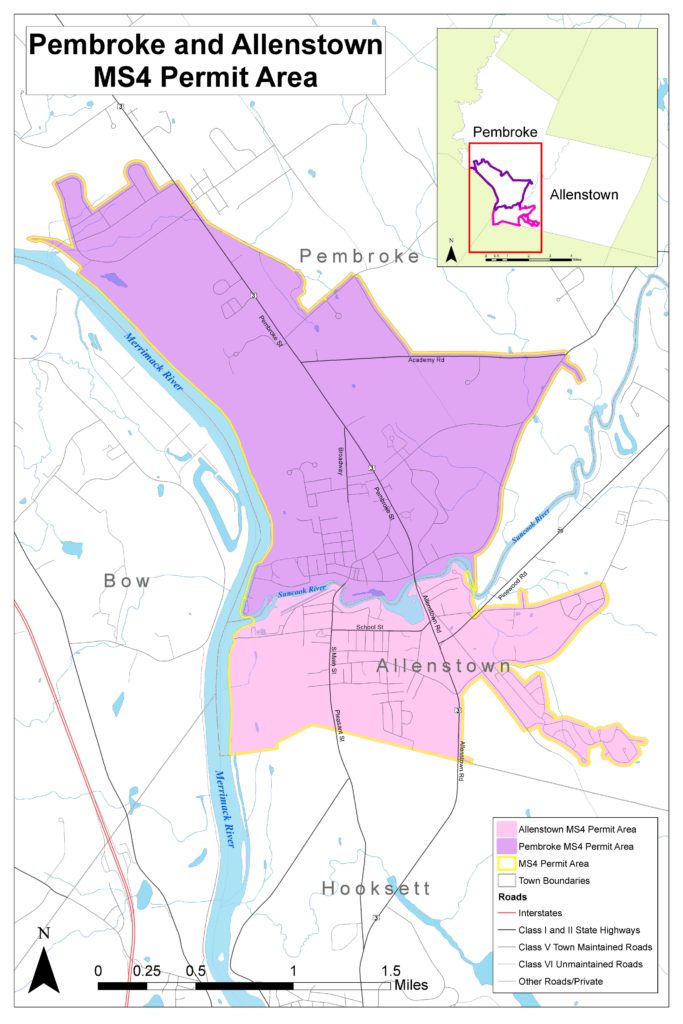What is an MS4?
An MS4 is a conveyance or system of conveyances that is:
- Owned by a state, city, town, village, or other public entity that discharges to waters of the U.S.,
- Designed or used to collect or convey stormwater (e.g. storm drains, pipes, ditches),
- Not a combined sewer, and
- Not part of a sewage treatment plant, or publicly owned treatment works (POTW).
Polluted runoff is commonly transported through MS4s and then often discharged, untreated into local water bodies. To prevent harmful pollutants from being washed or dumped into MS4s, certain operators are required to obtain NPDES permits and develop stormwater management programs (SWMPs). The SWMP describes the stormwater control practices that will be implemented consistent with permit requirements to minimize the discharge of pollutants from the sewer system.
MS4 Permit
Under these permits, the MS4 owner/operator must implement a collective series of programs to reduce the discharge of pollutants from the given storm sewer system to the maximum extent practicable in a manner that protects the water quality of nearby streams, rivers, wetlands and bays.
Background on the MS4 Permit
The Clean Water Act of 1972 authorizes the EPA and states to regulate point sources that discharge pollutants into waters of the United States through the National Pollutant Discharge Elimination System (NPDES) permit program. The point sources are generated from a variety of municipal and industrial operations including treated wastewater and stormwater runoff from drainage systems called Municipal Separate Storm Sewer System (MS4).The NPDES permit program created two phases of MS4s. Phase I formed in 1990, regulating the discharges from MS4 systems, construction activities, industrial activities and water quality impacts for medium to large cities serving a population of 100,000 or more.
Phase II regulates discharges from MS4 systems, construction activities, industrial activities and water quality impacts for small urbanized areas. NH has several municipalities that are designated Phase II MS4s, including Allenstown and Pembroke. EPA uses the Census Bureau definition of urbanized areas - “a central place (or places) adjacent to a densely settled surrounding territory that together have a residential population of at least 50,000 and an average density of at least 1,000 people per square mile.” The MS4 general permit requires Allenstown and Pembroke to prepare a stormwater management plan that controls pollutants from all of the MS4 discharge points to the “maximum extent practicable.” The most important requirement is that the stormwater management plan include six minimum control measures:
- Public education and outreach on stormwater impacts
- Public involvement/participation during program development
- Illicit discharge detection and elimination
- Construction site stormwater runoff control
- Post-construction stormwater management in new development and redevelopment
- Pollution prevention/good housekeeping for municipal operations
For more information about MS4 stormwater permits, please visit EPA’s NPDES Stormwater Program website is at https://www.epa.gov/npdes/npdes-stormwater-program and the EPA New England address is https://www3.epa.gov/region1/npdes/stormwater/index.html The NHDES website on the Federal Stormwater Program, is at https://www.epa.gov/npdes-permits/npdes-stormwater-permit-program-new-england
For information on the managements plans for the Allenstown and Pembroke, please see the individual pages on this website.
Notice of Intent
In order to obtain coverage under the MS4 general permit, a notice of intent (NOI) must be filled within 90 days of the permit effective date by the owner/operator. The NOI serves as the owner/operator's notice to EPA and NHDES that it intends to operate a MS4 as authorized under the terms and conditions of the permit, and certifies that the owner/operator meets the permit's eligibility criteria. The NOI conveys information on how the MS4 intends to comply with permit conditions by listing proposed Best Management Practices (BMP), measurable goals associated with each BMP, and responsible parties. Specific details of each BMP will then be identified in the Stormwater Management Plan (SWMP), including how the owner/operator intents to implement to meet permit requirements.
Stormwater Management Program
As outlined by the MS4 general permit, the owner/operator shall develop, implement, and enforce a written Stormwater Management Program (SWMP). The SWMP is the document used by the permittee to describe the activities and measures that will be implemented to meet the terms and conditions of the permit. The initial SWMP shall accurately describe the permittee's plans and activities as described in the notice of intent and updated as needed. View the SWMP for both Allenstown and Pembroke.

